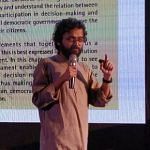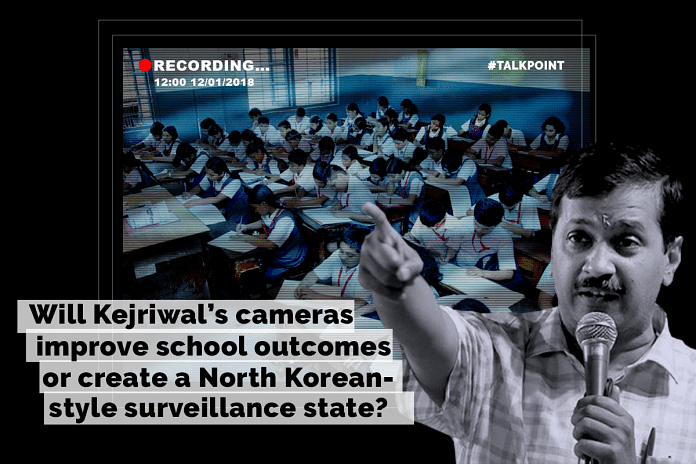In 2017, multiple incidents involving students took place within the premises of schools, some of which were fatal. In its bid to ensure the safety of children and improve learning outcomes, the Kejriwal government in Delhi is installing closed-circuit cameras in classrooms across government schools.
ThePrint asks: Will the installation of cameras in schools improve outcomes or create a North Korean surveillance state?
Now parents can rest assured that their kids are constantly being watched.
 Ashutosh
Ashutosh
AAP Spokesperson
Out of the box thinking has been the hallmark of the Aam Aadmi Party’s politics and governance. It has been liked by a few, and criticised by many. Education is the most neglected department in independent India. No state or central government has made any worthwhile attempts to link it to the process of nation building.
The Delhi government has taken revolutionary steps to upgrade the standard of government schools. These have been appreciated by all, as they are connected to the larger dream of India emerging as a superpower.
The government’s initiatives focus on two things – improving infrastructure and curriculum; and making teachers and principals accountable. Teachers and principals have a great responsibility as caretakers of future generations. It is in this context that CCTV cameras are being installed in classrooms.
Such a step may be severely criticised, but the critics will realise their folly later. People took years to adjust to computers, as they thought computers would create a jobless society.
CCTV cameras in classrooms have three functions. First, they will ensure a sense of discipline. Students and teachers will both be more alert about what, and how, they do things.
Second, it will help improve the relationship between teachers and students. Parental input can help address what is lacking in the system.
Third, the safety and security of the kids is paramount. Several horrific incidents have been reported over the last few months. Now parents can rest assured that their kids are constantly being watched. Constant monitoring will minimise untoward incidents.
A few might feel it’s too intrusive. Some also complain that the mere presence of cameras will kill spontaneity, and hinder the natural growth of children. However, these apprehensions need to be substantiated with data. The AAP government is open to all kinds of suggestions, and is willing to take corrective measures, if needed in the future.
But the safety and security of the kids can’t be compromised.
The government should focus on creating an environment that is conducive to learning.
 Shyamlal Ganguli
Shyamlal Ganguli
Chief education officer at Aditya Birla Group
If you talk about ethics, it is most unethical to put CCTV cameras in classrooms. If we don’t trust our teachers, then how can they deliver? We need have to have faith in our teachers.
It is very unfortunate that we even have to consider such a thing. In some schools in Delhi and Noida, CCTV cameras have been present for over 20 years. I was surprised to see that principals were tracking classrooms with them.
This is clear policing. Education works on trust. Cameras for vigilance is one thing. They can be used to address untoward incidents. However, increased surveillance may cause more harm than good.
About 25 per cent of our students in the 14-18 age group can’t even read, which means teachers aren’t doing their jobs well. But using CCTV cameras will not help them. We need better teachers, not constant surveillance.
What does Kejriwal hope to achieve by keeping teachers under the scanner? Government teachers are the ones who go on strike often. What if they protest against this? It will only create disgruntled teachers. The quality of teaching may go down. Teachers may lose confidence.
The government should focus on creating an environment that is conducive to learning. Teachers should be taken into confidence, and not monitored. There can be constant appraisals, and feedback sessions, with all the stakeholders. If principals and senior management take rounds then we don’t need CCTV cameras.
CCTV cameras will create an unpleasant environment. India is a land where we are taught to respect our teachers: ‘गुरुर्ब्रह्मा गुरुर्विष्णु र्गुरुर्देवो महेश्वरः.’ Even rajas and maharajas trusted the gurus and sent their children to ashrams. Where were the CCTV cameras then?
This not a solution. We need better teachers and good schools.
What next, cameras in bathrooms of schools?
 Enakshi Ganguly Thukral
Enakshi Ganguly Thukral
Co-Director HAQ: Center for Child Rights
It is very difficult for me to say off-hand whether installing cameras in classrooms is a good or bad move. What is more important is to ask: How was this decision arrived at?
As I see it, the biggest problem with such an approach is the quick fix method. There is no discussion about its necessities or possible consequences. The instantaneous reaction never factors in due diligence. Today it is CCTV cameras, tomorrow it will be something else. The Ryan case happened in the bathroom, so should cameras be put in the bathroom as well? Sounds bizarre, but who knows, some wise person may see that as the solution!
The reality is, we all want schools to be safe spaces for children. For this we need to take a 360-degree view based on discussions with teachers and staff of schools, parents of students, child psychologists, experts and equally important—the children in school themselves. We never seem to ask the students how they will feel safe in schools. It is only then that such decisions must be taken.
Currently, the way solutions are arrived at are reactionary – an incident occurs, and a decision is made in response. It is a way for the concerned authorities to announce – we have acted! But because it is not based on holistic thinking and planning, they may or may not be the right, or the only, solution.
Whether such an action is ethical or not can be determined only by factoring in the context. Has the government consulted all the stakeholders, would be better question to ask.
Kids will now be living in constant fear of doing something which might upset their parents
 Meghnad S.
Meghnad S.
Political Analyst
Parents of Delhi, try this.
Tell your kid tomorrow: “I am going to watch everything you do in school. CCTV cameras will help me keep a watch on you at all times so you better behave, OK?” I’m quite certain your child will not be very pleased with the idea.
There’s a lot to be said about self-determination here. Self-determination is the ability of a person to make their own decisions, or think in a certain way without outside influence. When an authority figure is watching, the target will conform and behave in a way that the authority wants him/her to behave. In this case, the authority figure will be parents.
In a classroom, with a CCTV camera watching students at all times, the kids will be living in constant fear of doing something which might upset their parents. Even without the presence of CCTVs, kids think twice before asking the teacher a question. They assume that if it’s an uncomfortable query the class will make fun of them.
Now with CCTVs, there is the added pressure of not just their parents watching, but even their classmate’s parents peering at their phone screens, watching a live feed of events unfolding in class.
And none of the students can get up and say, “Bigg Boss, I want to go to the confession room.”
Our education system is, by default, geared towards making kids conform to societal standards and be ‘model’ citizens. It does not reward creativity, and therefore creativity ends up taking the form of rebellion. If kids are already being watched at home, and now will be watched in schools, I can’t even imagine the kind of effect it would have on their behaviour.
This move is geared towards making the schools ‘safer’ and classrooms more ‘transparent’. Perhaps, it would have been a better idea to hire security staff for to make schools ‘safe’ and better teachers to make them ‘transparent’. The biggest victims here are the kids in class, not parents, and definitely not the teachers.
Compiled by Deeksha Bhardwaj




I strongly agree with Dr Shyamlal Ganguli Chief Education Officer Aditya Birla Group that it is most unethical to put CCTV cameras in classrooms reason the fear of being watched every moment will hamper the over all development of the child. The child will be in constant fear of being watched. The child will become more introvert and would fear sharing. I personally think that Mr Kejriwal should have had a discussion with a child Psychatrist and other educationist before taking such a decision.one cannot compare children with computers. Mr Meghnad S. is right.the kids will be living in constant fear of doing something which might upset their parents. Even without the presence of CCTVs, kids think twice before asking the teacher a question. They assume that if it’s an uncomfortable query the class will make fun of them and now where every action is captured the child will not share his piece of mind with anyone. We are saying”पढेगा India तभी तो बढेगा India “but if
constant डर में रहेगा India तो कैसे विकास करेगा India ‘” I personally am scared to think that with this constant fear of being watched will give us which type of citizen ?That answer will be again something Out of the box thinking ???
How very hypocritical of ThePrint’s which recently derided anti-Aadhaar activists but now gives voice to opinions (the majority of) which are against surveillance in schools.
It logically follows that these anti-surveillance opinions also belong to the same wine-drinking and cheese-eating elite.
Surveillance is a weapon which the state uses to create a chilling effect.
It makes no difference whether the targets are children or adults.
As pointed by Mr Shyamlal Ganguli, that don’t we trust our teachers. I think the whole idea is not about trust or distrust. Its about student and teacher safety. Having the thought of being under surveillance, will teach students to be calm and respectful to others. It will definitely stop bullying and harassment among students and teachers will be more careful about their conduct in classroom. If nobody is doing nothing wrong then what is the fuss about. Why are students and teachers concerned about. In fact they should be happy they are being monitored and are safe.
Like Mr Meghnad S. said, about students hesitating to ask questions to teachers due to camera is utterly illogical. The class will make fun even if there are no cameras.
Lastly addressing Enakshi Ganguly Thukral, I would like to say that no body in the right mind would suggest to install cameras in bathrooms, let along implementing it. The mere thought of having a cctv camera will divert the thought of any serious mischief or crime in the school vicinity.
I appreciate this initiative by the delhi govt. Wish the same system was there, when i was in school.